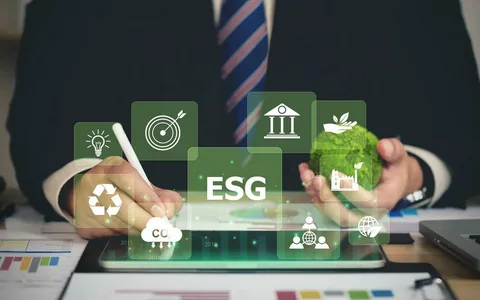The Rise of ESG Investing: Should You Join In?
Nowadays, investors worldwide are increasingly making ESG investment decisions. It is commonly known as Environmental, Social, and Governance (ESG), encompassing the additional aspects that today’s investors consider. As there is now greater attention on climate change, social justice, and corporate accountability, ESG investing enables individuals to align their investments with their values.
As purpose-driven investments are in high demand, both individuals and organizations are adopting new strategies to meet this growing need. Millennials and large hedge funds have recently shown a keen interest in companies that adhere to Environmental, Social, and Governance (ESG) practices. Still, one may wonder how this affects ordinary investors and if ESG investing is as popular as it appears.
This piece examines the foundations of ESG investing, its advantages and disadvantages, and whether it aligns with your financial strategy. Because we cover 13 key areas in this guide, you will be able to determine if ESG investing is suitable for you.
- Understanding ESG: What It Really Means
ESG investing is mainly based on following Environmental, Social, and Governance criteria. Environmental factors check how much a business pollutes the environment by releasing carbon, managing waste, and using energy. Labor practices, human rights observance, and community care are collectively referred to as social considerations. The practice of governance focuses on board diversity, executive compensation, and the level of transparency within the company.

With the help of these three, investors assess a company’s future strength and the ethics of its operations. While looking for profits is one goal, ESG examines how businesses meet society’s needs. Examining the entire picture makes it easier to understand a company’s role in its surrounding world.
With ESG filters, investors try to avoid risky companies and aim for better results by picking firms that are well-managed and modern. It is thought that if a company has good ESG performance, that can signal its financial strength and the chance of enduring success in the future.
- Why ESG Is Gaining Popularity
Many world events have made ESG investing more noticeable. The unpredictable climate, corporate errors, and increasing unrest have led both the public and investors to notice the results of careless business conduct. Therefore, many more individuals are interested in ethical investing.
Looking at ESG is very attractive to the younger generation of investors. In comparison to previous generations, these individuals tend to prioritize sustainability, diversity, and transparency, and they are poised to inherit substantial wealth. As people change the way they invest, banks and other financial institutions are offering additional ESG products.
Supporting ESG disclosures, it is helpful to look at the growth of ESG laws and regulations. Governments and agencies are making it clear, sometimes requiring, that companies show ESG transparency. Due to increased accountability, investors have more choices for ESG investment funds.
- ESG Performance vs Traditional Investing
Many believe that ESG funds sacrifice strong returns to align with the investor’s moral or social beliefs. But recent research shows something different. ESG portfolios frequently match or exceed traditional ones, mainly when the economy is uncertain.
Firms with good ESG records typically manage risks effectively and operate efficiently. They can guard themselves against expensive legal suits, possible harm to their reputation, and regulations concerning environmental protection. For this reason, long-term investors are more inclined to invest in these stocks.
Although ESG investments are not always quite as profitable as others, they tend to stay steady through ups and downs. People are happy to invest in ESG because they want their efforts to support sustainability without giving up strong financial results.
- How to Evaluate ESG Funds
Since not every ESG fund is the same, it is essential to exercise caution when making a choice. In some cases, companies claim to have environmentally friendly principles, but they fail to act on them. One should look into more than just promotional material to learn the principles of a fund.
Analyzing an ESG fund means examining how it selects its investments, the process it follows, and its leading investments. Examine how the fund evaluates companies based on ESG indicators and how it implements its screening strategy. The process should be transparent to all the candidates.

Third-party organizations give important rankings and ESG measurements. There are organizations such as MSCI, Morningstar, and Sustainalytics that rate companies on their adherence to environmental and social guidelines. You can base your decisions on these tools.
- Environmental Focus: Going Green
Those concerned with climate issues tend to find the environmental part of ESG investing most appealing. Green-focused funds select companies that reduce carbon emissions, properly manage the earth’s resources, and develop advances in renewable energy.
Green bonds, renewable energy exchange-traded funds, and mutual that focus on sustainability are seeing fast growth. They help companies that work to reduce global emissions from climate change. When leaders set net-zero goals, more people will seek green investment opportunities.
Environmental sustainability is important to investors because it is both the right thing to support and a smart investment strategy. Adopting eco-friendly habits by companies ensures that they are ready for upcoming guidelines and what their clients expect, which helps the business grow over time.
- Social Criteria: People Over Profits
The social pillar assesses how a company looks after its employees, customers, and communities. To measure performance, the company evaluates its labor practices, workplace diversity, data privacy, and product safety. Successful teams in which they are part are known to adjust well and be respected by others.
Over the past few years, ethical and social matters have become important in the world of investing. Enabled by #MeToo and Black Lives Matter, people are now discussing the pros and cons of their workplace culture. These days, investors are interested in how businesses respond to social trends.
When a company demonstrates strong social responsibility, employees are likely to be happier, customers remain loyal, and brand value increases. Investors are realizing that social impact plays a significant role in shaping a company’s reputation and profits.
- Governance Matters: The Backbone of Stability
When a company has good governance, it conducts its business activities honestly and holds itself accountable to all stakeholders. Such practices include ethical leadership, having independent boards, paying fair compensation, and implementing anti-corruption measures.
When a company is not well-managed, it can result in scandals, legal issues, and a decline in its stock price. The downfall of big companies has put governance matters in the spotlight. More attention is being given to these aspects when investors build portfolios these days.
Practicing good governance helps a company’s finances, and its future decisions are usually more informed. As they prioritize openness and shareholder interests, they encourage steady investment and minimize high levels of risk.
- The Role of Technology in ESG Investing
Technology plays a crucial role in advancing ESG investing. With the help of artificial intelligence, blockchain, and big data analytics, companies can follow and check their ESG activities. Because of these tools, ESG reporting becomes both correct and available to many audiences.
Many ESG funds rely on technology-based systems to evaluate businesses and manage risks. With powerful algorithms, examining large amounts of data becomes quick, allowing for the detection of red flags and opportunities before human workers.
There is also a close examination of technology companies. Investors assess how these companies manage private data, office culture, and their supply chain operations. ESG and technology are playing a bigger role in creating future investment portfolios.
- ESG and Corporate Responsibility
It is now clear to companies that ESG compliance matters for the long run, not only for the benefit of investors. Businesses now take corporate responsibility seriously as a key goal, not just as a means to appease the public.
Firms that participate in ESG initiatives often report that their customers are more satisfied, employees tend to stay longer, and their operations improve. They become factors that set the company apart and increase its value for investors.
Should ESG be integrated into a company’s culture, those that fail to pay attention may lag behind. Investors are now giving more attention to companies that are responsible and inclusive.
- Risks and Challenges of ESG Investing
ESG investing may appeal to people, yet it still faces some problems. A significant issue is that ESG metrics are not standardized. The scores assigned to companies by various agencies may differ, making it challenging to compare them.
Greenwashing creates another issue. In some cases, funds exaggerate their environmental and social considerations. This may confuse investors and erode the trust people have in ESG labels. Authorities are focusing on solving this problem, but it’s still advisable to be cautious.
Moreover, ESG investing typically means investors avoid certain sectors related to the defense or exploitation of natural resources. This may compromise diversification and expose investors to certain market risks. It is essential to be aware of these limits when selecting your investments.
- ESG for Individual Investors
There are now more methods than ever for an individual to participate in ESG investing. It is now straightforward to utilize online platforms for ESG ratings and ETFs that cater to various ethical and financial objectives. For this reason, building a portfolio that makes a difference to you is a straightforward process.
These days, some robo-advisors are creating ESG portfolios that are linked to environmental and social responsibility. They are perfect for people who are just beginning and want help handling most of the details.
Nowadays, you can also use ESG investment strategies with traditional brokers. Investors may help bring about a greener world by planning and choosing goals when deciding how to invest their money.
- The Future of ESG Investing
It appears that ESG investing will have a promising future ahead. Due to greater understanding, advancements in technology, and new regulations, ESG is poised to play a significant role in finance worldwide. ESG is now a crucial component of how many investors plan and make decisions.
When ESG data is more regular and transparent, more people will trust its results. With new ways of working, investors can measure their impact, track their progress, and stay aligned with their goals.
ESG factors are likely to become a standard in all types of investing in the future. Being so closely connected, ESG and traditional investing may ultimately prove to be fundamentally the same over time.
- Should You Join the ESG Movement?
Whether someone participates in the ESG movement is influenced by their principles, financial plans, and their preferred level of risk in investments. ESG investing enables you to invest your money in companies that prioritize sustainability, equal rights, and good governance.
However, you should conduct thorough research and select ESG products that meet your expectations. Avoid relying solely on labels and inspect the details to determine how and where your money is spent.
Since ESG investing is not a one-size-fits-all approach, it can be a valuable addition to an investor’s diversified portfolio. Sensible participation enables you to contribute to positive change and earn attractive returns.
Conclusion
The way people perceive money, achievements, and responsibility has shifted, driving the growth of ESG investing. It is no longer sufficient to look only at profits; purpose and sustainability have become integral parts of performance measurement nowadays. As an ESG investor, you can help the environment by choosing responsible companies, as impact and return are fundamental to this approach.
No matter how experienced you are, ESG investing provides every investor with a way to align their values. As the financial world evolves, incorporating ESG considerations may help you feel good about your investments and achieve good returns.



